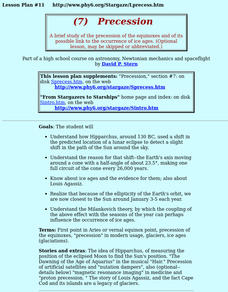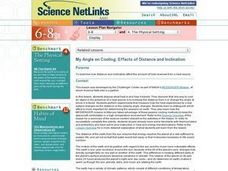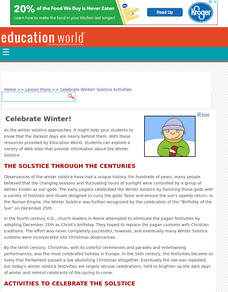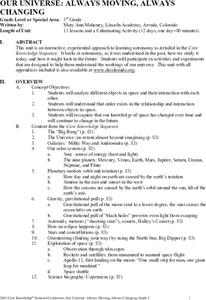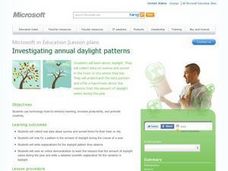Curated OER
Precession
Students explain how Hipparchus, around 130 BC, used a shift in the predicted location of a lunar eclipse to detect a slight shift in the path of the Sun around the sky. They examine the elliptical orbit in which the Earth travels around...
Curated OER
Is it Really Winter in Australia? It is June!
The purpose of this activity is to determine how the location of a place on the Earth (hemisphere) determines what season that place is experiencing relative to the Sun's rays. Day one the students will be introduced to the terms...
Curated OER
My Angle on Cooling: Effects of Distance and Inclination
Learners discuss what heat is and how it travels. They discover that one way to cool an object in the presence of a heat source is to increase the distance from it or change the angle at which it is faced.
American Museum of Natural History
A Closer Look at Mars
A website looks at how we know so much about Mars—telescopes, robots, and spacecraft—and the search for martian life. Following the informational text are three questions that quiz pupils about possible life on Mars.
Curated OER
Climatic Zones
Third graders recognize and locate Frigid, Temperate, and Torrid climatic zones on the word map or globe. They explain that plants, animals, and human societies display adaptations to the climates they live in .
Curated OER
Water and Ice: Part 1
Students observe the state changes in water. In this matter lesson, students observe, measure, and describe water as it changes state. Students explore how water can change from a solid to a liquid then back again. They journal their...
Curated OER
Winter Holiday Celebrations
Students understand how holidays revolve all around light. In this winter holidays lesson, students find the similarities and differences between the winter holidays. Students discuss the winter solstice and how it relates to the holiday...
Curated OER
The Solstices
Compare surface temperatures when the solstice occurs in the different hemispheres. Young scientists draw conclusions from their investigation of data collected using spreadsheets and a globe.
Curated OER
Look At Those Leaves!
Young scholars observe, measure and sort leaves. In this leaf lesson students divide into groups and observe the different kinds of leaves.
Curated OER
Fall Lesson Plans
Fall lesson plans can combine science, history, and writing into an enticing combination.
Aiken County Public Schools
Claymation in the Classroom
Students design an appropriate and usable storyboard and then create a claymation video. They take digital photographs frame by frame, then assemble the stop-motion movie using video software.
Curated OER
Celebrate Winter!
Students understand, and participate in, both the historical and scientific aspects of this year's celebrations by introducing them to a selection of activities.
Curated OER
Taiga
In this taiga instructional activity, students read a short article describing what a taiga is and then answer 10 multiple choice, true or false or short answer questions relating to the article.
Curated OER
Making Sense Of A Round World On A Flat Surface
Students engage in a lesson that is concerned with the development of geography skills. They take part in a number of activities that center around finding and traveling to different locations. The lesson has resource links that can be...
Curated OER
Exploring the Night Sky: Fall/Winter
Young scholars explain how moon phases occur. They explain three ways that the night sky has been used through history. Students locate some of the constellations in the night sky. They discuss stories and myths surrounding stars.
Curated OER
Knowing North: Understanding the Relationship Between Time and The Sun
Young scholars determine how to find North using a watch and their shadow. In this finding North activity, students go outside on a sunny day and work with their shadow and a wrist watch to find out which direction that North is. They...
Curated OER
Astronomy
Students complete a unit of lessons on our solar system, its stars, and astronomers. They record information in a space journal, design constellations, define key vocabulary, observe the phases of the moon, and create a group planet...
Curated OER
Ancient Sun Models of the World
Students explain that many different cultures across the world developed their own reasoning for the weather around them. They explore the different cultural beliefs of the sun's cycle and to create their own story of the sun's movement.
Curated OER
Today's Weather on Mars
Students investigate the temperature and wind data locally, nationally, and internationally and compare these conditions to those on Mars. Conclusions are drawn about the differences of these conditions and the causes for the variance...
Curated OER
Climatic Changes
In this climate changes worksheet, students review the different events such as volcanic eruptions and El Nino that change the climate. This worksheet has 5 multiple choice and 5 short answer questions.
Curated OER
Our Universe: Always Moving, Always Changing
Students explore the main concepts of astronomy through the eleven lessons of this unit. The past, present, and future methods of studying the science are examined in this unit.
Curated OER
Graphing San Diego Tides
Students observe the tides in San Diego for one month. Using this information, they graph the tides on a chart along with the phases of the moon. They answer questions related to the graph to end the lesson.
Curated OER
Investigating daylight
students investigate a natural factor affecting their everyday lives: daylight. First, they collect data on sunrise and sunset in their hometown, create a Microsoft Office Excel chart to help them understand the data pattern, and offer a...
Illustrative Mathematics
Illustrative Mathematics: G Mg Tilt of Earth's Axis and the Four Seasons
This task gives students a chance to explore the effects of the Earth's tilt and rotation using a simple geometric model of Earth-Sun interaction that shows why the seasons occur. Aligns with G-MG.A.1.


